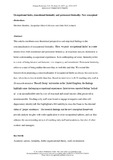- CERES Home
- →
- Cranfield Defence and Security
- →
- Staff publications (CDS)
- →
- View Item
JavaScript is disabled for your browser. Some features of this site may not work without it.
| dc.contributor.author | Bamber, Matthew | |
| dc.contributor.author | Allen-Collinson, Jacquelyn | |
| dc.contributor.author | McCormack, John | |
| dc.date.accessioned | 2017-06-29T11:21:39Z | |
| dc.date.available | 2017-06-29T11:21:39Z | |
| dc.date.issued | 2017-06-12 | |
| dc.identifier.citation | Bamber M, Allen-Collinson J, McCormack J. (2017) Occupational limbo, transitional liminality, and permanent liminality: new conceptual distinctions. Human Relations, Volume 70, Issue 12, December 2017, pp. 1514-1537 | en_UK |
| dc.identifier.issn | 0018-7267 | |
| dc.identifier.uri | http://dspace.lib.cranfield.ac.uk/handle/1826/12127 | |
| dc.identifier.uri | http://doi.org/10.1177/0018726717706535 | |
| dc.description.abstract | This article contributes new theoretical perspectives and empirical findings to the conceptualization of occupational liminality. Here, we posit ‘occupational limbo’ as a state distinct from both transitional and permanent liminality; an important analytic distinction in better understanding occupational experiences. In its anthropological sense, liminality refers to a state of being betwixt and between; it is temporary and transitional. Permanent liminality refers to a state of being neither-this-nor-that, or both-this-and-that. We extend this framework in proposing a conceptualization of occupational limbo as always-this-and-never-that, where this is less desirable than that. Based on interviews with 51 teaching-only staff at 20 research-intensive ‘Russell Group’ universities in the United Kingdom, the findings highlight some challenging occupational experiences. Interviewees reported feeling ‘locked-in’ to an uncomfortable state by a set of structural and social barriers often perceived as insurmountable. Teaching-only staff were found to engage in negative and often self-depreciatory identity talk that highlighted a felt inability to cross the līmen to the elevated status of ‘proper academics’. The research findings and the new conceptual framework provide analytic insights with wider application to other occupational spheres, and can thus enhance the understanding not just of teaching-only staff and academics, but also of other workers and managers. | en_UK |
| dc.language.iso | en | en_UK |
| dc.publisher | SAGE | en_UK |
| dc.rights | © The Authors. Published by SAGE. This is the Author Accepted Manuscript. Please refer to any applicable publisher terms of use. | |
| dc.subject | Academic careers | en_UK |
| dc.subject | liminality | en_UK |
| dc.subject | limbo organisational theory | en_UK |
| dc.subject | work environment | en_UK |
| dc.title | Occupational limbo, transitional liminality, and permanent liminality: new conceptual distinctions | en_UK |
| dc.type | Article | en_UK |
Files in this item
This item appears in the following Collection(s)
-
Staff publications (CDS) [1209]
